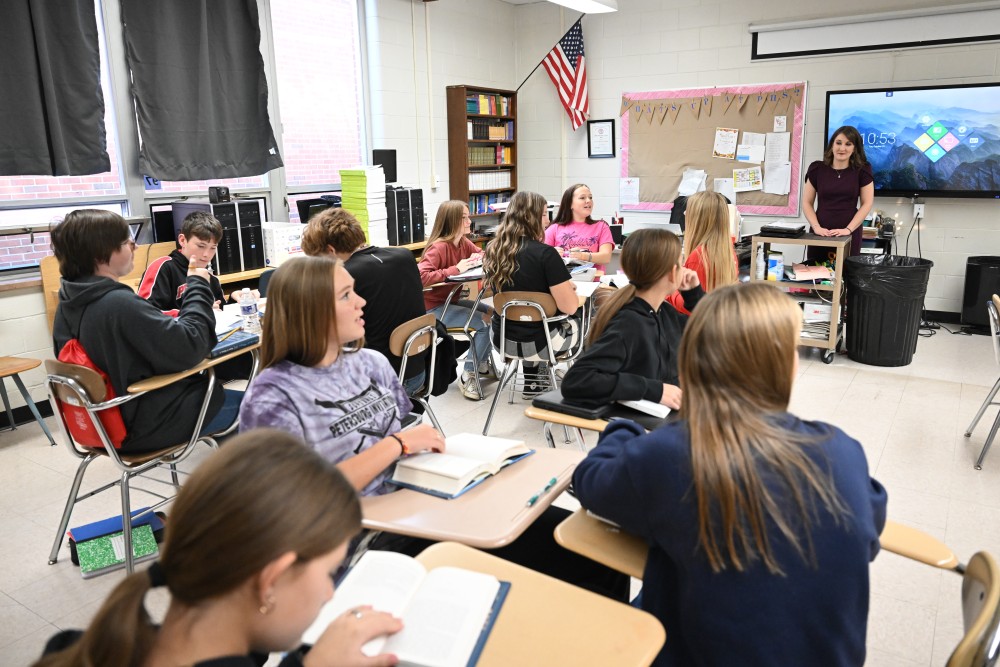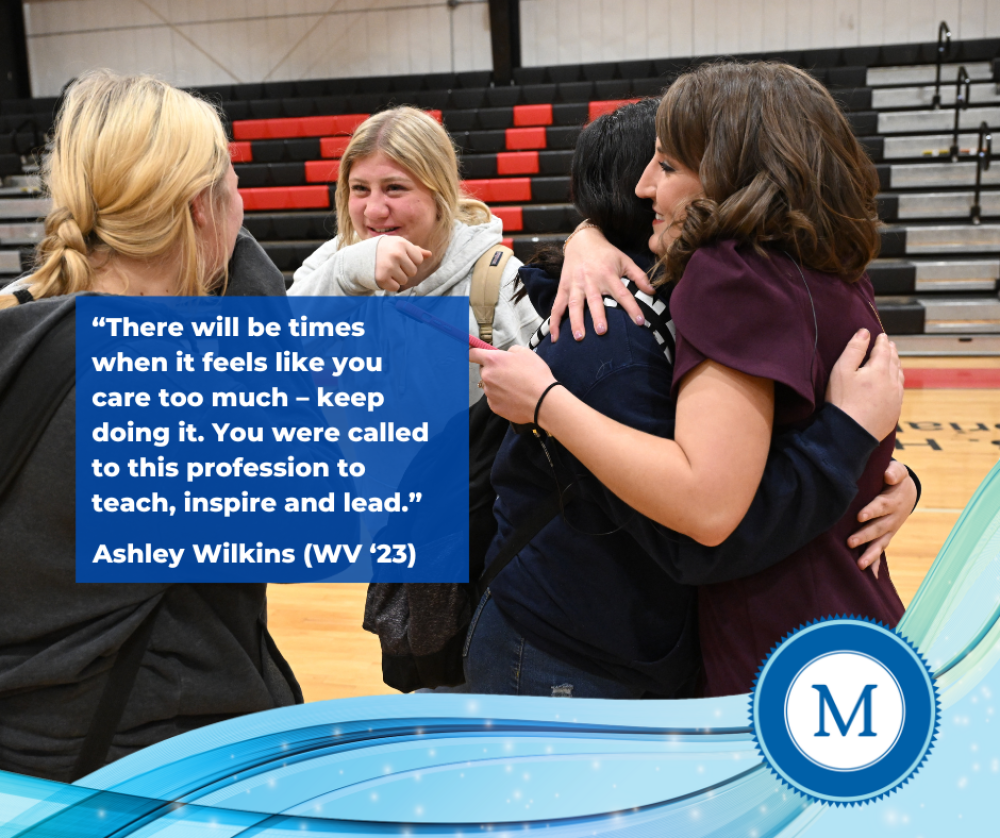Spotlight: Ashley Wilkins (WV '23)
August 29, 2024
West Virginia Milken Educator Ashley Wilkins sets high expectations for her English language arts students. Role models like her AP English Language teacher, Michelle Wolfe (WV '21), inspired her to become an educator. Now, she implements the same standards that reinforced her ability to connect with literature in her own classroom. “I hope my students remember that because I loved them, my expectations for them were much higher than what they had for themselves.” Ashley received a 2023-24 West Virginia Milken Educator Award in Petersburg on October 31, 2023.
Milken Family Foundation: How have students responded since your Milken Educator Award surprise?
Ashley Wilkins (WV '23): My students have been very excited for me throughout this journey. They were just as shocked as I was at the notification. They were mesmerized when I returned from the state recognition ceremony with my obelisk and continue to ask what I plan to do with the money.
MFF: Is there an experience you had in the classroom as a student that shaped who you are as an educator?
Wilkins: My role models as an educator were both my own teachers and my fellow co-workers. David Rudy was my high school chemistry and trigonometry teacher, and while I did not enjoy the subjects, I loved the class. He had a way of making everyone feel welcome, included, and like the smartest person in the room. His belief in us motivated everyone who had the pleasure of being his student. Two weeks after my notification, he mailed me a congratulations card where he ran out of room writing how proud he was of me, going to show that good teachers never really retire. A second influence was my high school AP English Language teacher, Mrs. Michelle Wolfe, who also happens to be a Milken Award winner. Her classroom environment and ability to connect me with literature is what influenced me to become an English teacher. The icing on the cake was hearing her yell, “she’s mine” as I accepted the check. It was fate that she made it to the notification, and I have very much enjoyed this journey with her as part of our state network.
MFF: Tell us about your first year of teaching.
Wilkins: My first year of teaching was a roller coaster to say the least. The week before school began in 2017, I attended the county fair as I do every year. As I paid for my food at the Lion’s Club booth, the wife of the then principal of Petersburg High School approached me about a position teaching eighth grade ELA. However, I had not graduated yet and was set to do my student teaching in a neighboring county. One thing led to another, and I was offered a teacher in residence position for the fall semester that would become full time in January given that I completed the necessary steps to graduate. I accepted the position and began my student teaching semester with a cooperating teacher for the first half of the term, transitioning to the full time eighth grade position in October. But the fun didn’t stop there! I was in the smallest classroom in the middle school wing, which had no windows and carpet that was held down with duct tape running along the center. In February of that year, West Virginia public employees went on a historic nine-day work stoppage which extended our school year into June. My collaborative special education teacher, Casandra Greenwalt, was my lifeline throughout all of that. On top of everything that happened that first year, the students were also a pretty rough group. Her guidance, advice, and shoulder to cry on – sometimes literally – was what got me through and convinced me to stay in the district. Happily, she is now the seventh grade ELA teacher, and we get to continue our friendship and collaboration every year.
MFF: What do you hope students remember from their time with you?
Wilkins: I hope my students remember that because I loved them, my expectations for them were much higher than what they had for themselves. Often at the beginning of each year, students think that I am the “mean” teacher and equally as often by the end they see that my expectations are for good reason.
MFF: You earned a minor in Appalachian Studies while in college and have been a member of the Appalachian Studies Association. Can you tell us more about how you incorporate this background into some of your lessons? How important is it that your students are able to study the work of authors who also hail from West Virginia and Appalachia?
Wilkins: I loved my time at Shepherd University in the Appalachian Studies minor. I use a lot of this information when introducing and teaching Homer Hickam’s October Sky each year. I also begin the year with George Ella Lyon’s “Where I’m From” as an introductory activity for the autobiography unit.

MFF: What advice would you share with people who are interested in becoming teachers?
Wilkins: You may have known that this is what you wanted to do with your life since you were a child, or you may have just decided. Either way, teaching is a choice that will fulfill you and impact the way you see the world.
You are about to embark on the journey of a lifetime. I hope you see the beauty in this profession even on the hard days and fill your cup with people who inspire you. I hope that you find your tribe of co-workers who provide a sounding board, a shoulder to cry on, and a cheerleader when needed. Teaching is not for the weak; you will put in countless hours which often seem for naught until one day, one student will make it all worthwhile.
There will be times when it feels like you care too much – keep doing it. You were called to this profession to teach, inspire and lead. Don’t become stagnant and fall into the trap of mediocracy, anyone can become a teacher, but it takes dedication to become a great teacher. The ability to roll with the punches and pivot will serve you well. Each year presents challenges unique to your group of students and no two classes or grades are ever the same.
Take criticism from the public with a grain of salt. There are often external forces trying to tear down the institution of public education – don’t take them personally. Fight for what you know to be right for yourself, for your students, and for the future.
Be yourself, be open to ideas, advice and constructive feedback, but understand that no two people can replicate the exact same teaching style with the same outcomes. Find what works for you and make it your own. Make friends with veteran teachers and build on what they have to offer, but don’t be afraid to put your own spin on it.
Finally, love them. All of them – the hard ones, the brilliant ones, the hot-mess ones. Very often you will find that you are the only person saying those words and yours is the only positive influence they hear. Use each new school year as a refresh button and allow your students the grace to make their own impression. Lastly, don’t ever forget why you chose this profession – because you, and it, matter.
Watch our interview with Ashley Wilkins (WV '23) on the day of her Milken Award notification:
Don’t miss any new articles and updates from Milken Educator Awards:


